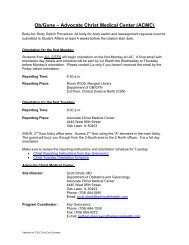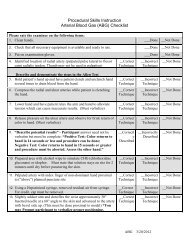a PDF version of the Full Hematology Oncology Curriculum
a PDF version of the Full Hematology Oncology Curriculum
a PDF version of the Full Hematology Oncology Curriculum
Create successful ePaper yourself
Turn your PDF publications into a flip-book with our unique Google optimized e-Paper software.
Inpatient <strong>Hematology</strong>/ Stem Cell Transplant Services<br />
University <strong>of</strong> Illinois Hospital and Health Sciences System<br />
I. Educational Goals (knowledge, skills, attitudes)<br />
The educational goals <strong>of</strong> <strong>the</strong> joint service <strong>of</strong> inpatient hematology and stem cell transplant (SCT) rotation<br />
at UIH are:<br />
1. To allow fellows to acquire insights into <strong>the</strong> care <strong>of</strong> patients undergoing high dose<br />
chemo<strong>the</strong>rapy and allogeneic or autologous transplantation<br />
2. To obtain a high degree <strong>of</strong> exposure to management <strong>of</strong> patients with lymphoma, leukemia and<br />
myeloma.<br />
Fellow Year 1:<br />
First year fellows rotate on <strong>the</strong> SCT service for approximately 1‐2 months. This is an intensive rotation<br />
and it is expected that fellows will quickly gain knowledge and skills in malignant hematology and stem<br />
cell transplant.<br />
Knowledge<br />
In this rotation fellows will be expected to increase <strong>the</strong>ir knowledge in <strong>the</strong> complex fields <strong>of</strong> malignant<br />
hematology and stem cell transplant. This includes several uncommon disorders which are treated with<br />
modalities which may not be familiar to <strong>the</strong> first year fellow. Fellows in <strong>the</strong> first year <strong>of</strong> <strong>the</strong>ir fellowship<br />
must acquire a lot <strong>of</strong> new knowledge in this area. Because <strong>the</strong>re is much to learn, this process takes<br />
time, and <strong>the</strong> depth <strong>of</strong> knowledge must increase progressively. At every stage <strong>of</strong> <strong>the</strong>ir training, fellows<br />
need to challenge <strong>the</strong>mselves by reading fur<strong>the</strong>r about patients <strong>the</strong>y evaluate on <strong>the</strong> service. They<br />
should actively look for relevant articles about any unfamiliar situation. Progressively, <strong>the</strong>y must develop<br />
expertise at recognizing <strong>the</strong> major clinical syndromes and <strong>the</strong>ir treatment.<br />
More specifically, first year fellows need to learn about all <strong>the</strong> areas <strong>of</strong> knowledge listed below. Within<br />
each area <strong>of</strong> knowledge, <strong>the</strong>y should first learn <strong>the</strong> information most relevant to <strong>the</strong> care <strong>of</strong> <strong>the</strong>ir<br />
patients. They should read regularly about <strong>the</strong>ir patients ei<strong>the</strong>r from established texts (available on line<br />
through <strong>the</strong> university library) or from review articles published frequently in ei<strong>the</strong>r hematology journals<br />
or core internal medicine journals.<br />
As fellows become increasingly knowledgeable, <strong>the</strong>y improve <strong>the</strong> quality <strong>of</strong> <strong>the</strong>ir teaching and<br />
consultations. They also become more independent over time, although attending back‐up is available<br />
24/7 and must be sought for any unfamiliar situation.<br />
32



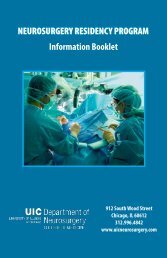
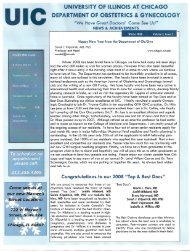
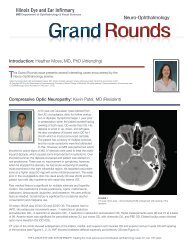
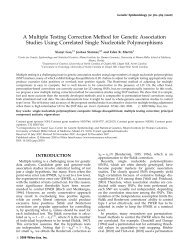
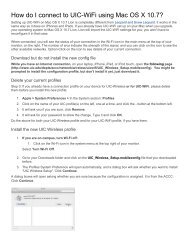
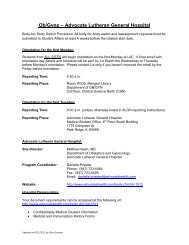
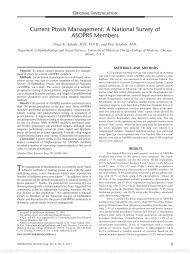
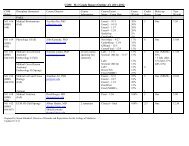
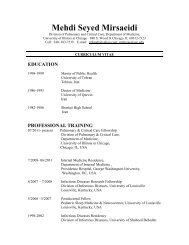
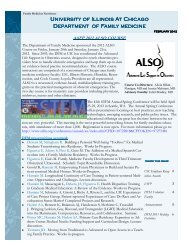
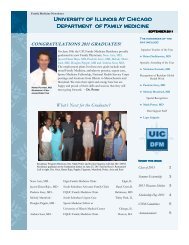
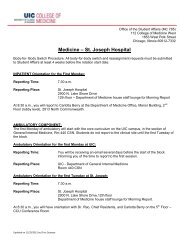
![CV Joan [W51] - University of Illinois College of Medicine at Chicago ...](https://img.yumpu.com/17336863/1/190x245/cv-joan-w51-university-of-illinois-college-of-medicine-at-chicago-.jpg?quality=85)
